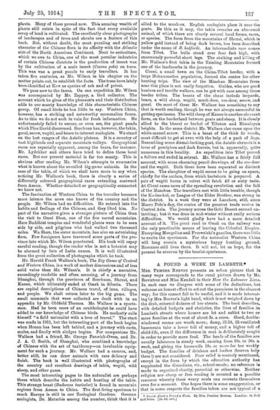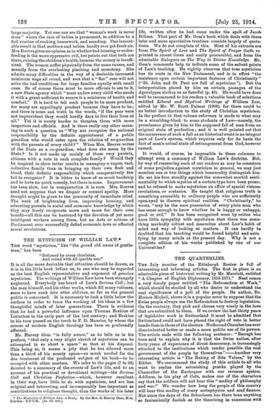A POUND A WEEK IN LAMBETH.* Him PESIDEB REE 1 TES presents
an urban picture that in many ways corresponds to the rural picture drawn by Mr. Rowntree and Miss Kendall in their How the Labourer Lives. In each case we disagree with some of the deductions, but welcome an honest effort to set out the premisses in the clearest way; for this cannot fail to be useful, and it is made interest- ing by Mrs. Reeves's light band, which is not weighed down by the drab, external dulness of her streets. The book describes, with detailed budgets and statistics, the lives of families in Lambeth streets where houses are let and sublet to two or more families at the rent of about 3s. a room. Good, double- windowed rooms are worth more ; damp, ill.lit, ill-ventilated basements take a lower toll of money, and a higher toll of child-life, even if the difference in rent is deliberately sought in order to provide more food. The heads of the families are usually labourers in steady work, earning from 18s. to 26s. a. week, and giving the housewife 188. or more for her weekly budget. The families of drinkers and loafers (heaven help them !) are not considered. Poor relief is scarcely mentioned, except in the form by which the education authority has supplanted the Guardians, viz., school-meals; no reference is made to organized charity, parochial or otherwise. Neither religion nor cheap or free reading is counted as a possible resource whereby these weary souls can recreate themselves even for a moment. One hopes there is some exaggeration, or that in some respects the families taken are not typical of a • Round About a Pound a Week. By Mn. Pember Reeves. London: G. Bea and Sons. [2s. Gd. net.]
large majority. Yet one can see that "woman's work is never done" where the care of babies is permanent, in addition to a full routine of cooking, housework, and mending. One lament- able result is that mothers and babies hardly ever get fresh air. Mrs. Reeves gives no opinion as to whether bad housing or under- feeding is the more oppressive evil, but points out that both are there, ruining the children's health, because the money is insuffi- cient. The women suffer physically from the same causes, and morally from the everlasting pinching and monotony. She admits many difficulties in the way of a desirable increased minimum wage all round, and sees that a " flat " rate will not solve the bad conditions for large families equally with small ones. So of course there must be more officials to see to it, a new State agency which "must endow every child who needs it with a grant sufficient to secure it a minimum of health and comfort." It is hard to tell such people to be more prudent, for many are appallingly prudent because they have to be ; and there is some sad truth in the words, "if the poor were not improvident they would hardly dare to live their lives at all." Yet it is surely harder to threaten them with more inspectors and officials. And is there really any other mean- ing in such a question as "Why not recognize the national responsibility by the definite appointment of a public guardian who would enter upon the relation of co-guardian with the parents of every child ? " When Mrs. Reeves writes of the State as a co-guardian, what does she mean by the State ? Is it not made up mainly of those very parents, citizens with a vote in each complete family ? Would they be inspired to show better results in managing a vague, vast, collective family than in bringing up their own flesh and blood, their definite responsibility which comparatively few fail to recognize ? It is bitter to know of so much hardship and to have no quick remedy, but there is none. Improvement has been slow, but in compensation it is sure. Mrs. Reeves need not suppose that we despair or counsel apathy. More thought might be given to the generosity of immediate relief. The work of brightening lives, improving housing, and educating parents in social and economic knowledge by which they may freely co-operate more and more for their own benefit—all this can be hastened by the devotion of yet more intelligent workers among them, but no Acts or actions of Parliament ever successfully defied economic laws or effected moral revolutions.







































 Previous page
Previous page